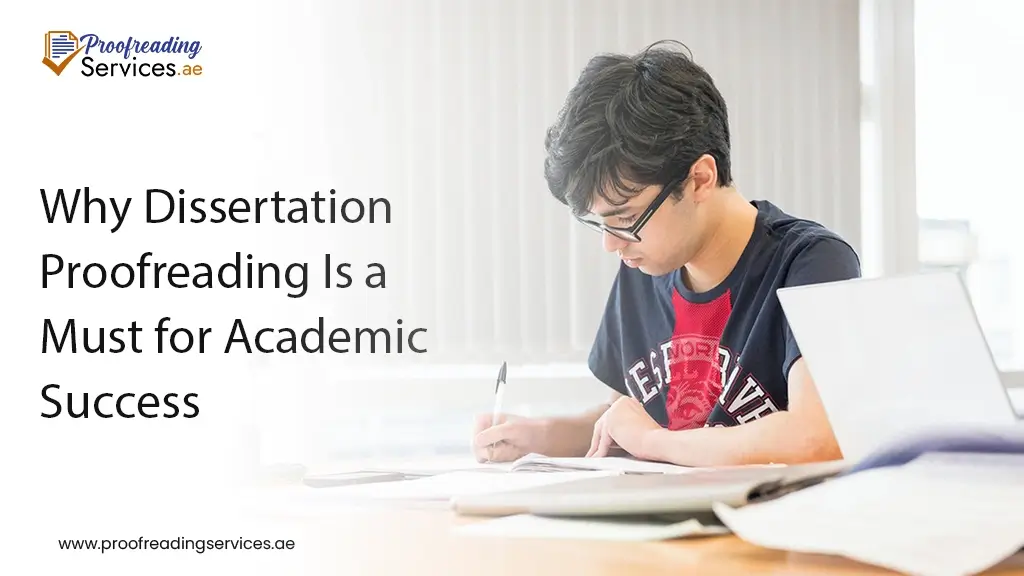Dissertation–nothing less than a nightmare for doctoral students.
This never-ending academic task takes months or even years to finish, just the research and writing process.
After completing these steps, proofreading knocks on your doorstep, saying, “Hey, you forgot me?”
Well, most students actually reply “yes” and close the door. The reason?
Do you know the average word count of a dissertation? Well, somewhere between 30,000-70,000. Insane numbers, I know!
So yes, proofreading that lengthy thing is no joke. And that’s one of the reasons students avoid this step.
But, let me tell you that proofreading a dissertation is CRUCIAL. You cannot skip it at any cost!
But why? What makes dissertation proofreading so important?
In this blog, we’ll find out the answer!
Difference Between Proofreading and Editing
| Proofreading | Editing |
| This is the last step, performed on the final draft of the document | Editing is done before proofreading |
| Fixes surface-level problems | Addresses the core features of the content |
| Eliminates grammatical errors such as spelling, punctuation, spelling, and typos. | Enhances the overall quality of the content by working on the clarity, readability, and factual check |
| Does not include word reduction | Involves word reduction, if required |
| Proofreading doesn’t require too much time | Editing might require a longer time to fix the content |
Why Proofreading Matters?
Proofreading—a process to fix grammatical errors and improve the readability and credibility of the content.
It ensures that readers understand your ideas without any problem. In addition, this is an important step in writing and should never be ignored.
Here are some reasons to proofread:
Credibility comes first
A dissertation shows your understanding and knowledge importance of a topic. Hence, mistakes in this task can undermine your credibility as a research student. Consequently, the proofreading step polishes and refines the final draft before submission.
Clarity and coherence
A research task, such as a dissertation, involves complex topics and ideas. Professional Dissertation Proofreading Services suggest that these concepts must be delivered perfectly without any poor or awkward sentence structure. Thus, it helps a reader understand the core concept of your writing task.
A good structure
As you fix the errors and use simple and understandable language in your dissertation, it improves the structure and flow of the entire document. In addition, proofreading also identifies and corrects factual mistakes before the final submission.
Follow academic guidelines
A dissertation requires following some academic guidelines, such as referencing style, proper evidence, and much more. In addition, the proofreading step makes sure that all these guidelines are followed and your work is aligned.
Is Dissertation Proofreading Important for Academic Success?
Johnson et. al. (2019) highlighted the importance of proofreading in academics. He further stated that students who neglect proofreading their tasks often get lower grades.
Dissertation is a lengthy academic task and also hold great importance to earn a doctoral degree. Yes, your entire degree is on the shoulders of this task.
The right choice of words, vocabulary, spelling, and zero grammatical mistakes creates a good and well-written dissertation. And it also impresses the assessors.
Also, you must keep in mind that even a pro writer makes small mistakes. So the only way around is to sit down and look for possible errors in the content.
This final step of the writing process before the submission demonstrates attention to detail and professionalism. In addition, it improves readability, protects your reputation, and effectively communicates goals.
7 Tips to Proofread a Dissertation
Proofreading could be hard if one doesn’t follow the right tips for it. So, make sure to read and understand the following tips to get the best results:
Take a break
The moment you finish the writing process of your dissertation, keep yourself away from it for at least a day. After taking a short break, get back to your dissertation and start looking for the mistakes.
Read with a different perspective
While you proofread your dissertation, it’s best to read the content with a fresh perspective if you are reading it for the first time as a reader. In addition, this helps to identify the errors more effectively.
Break it down
Proofreading a 50,000-word written task, a dissertation is no joke. Therefore, it’s suggested to break it down into smaller sections. Also, you can proofread section by section, like first the abstract, then the introduction, and so on.
One mistake at a time
Make sure to look for one mistake at a time. For example, if you are fixing misspelled errors, then fix them first. As a result, this approach will help you stay focused and reduce the chances of making any errors.
Read aloud
Silent reading can work. However, reading aloud can take you one step ahead. By following this approach, you can identify awkward sentences and phrases.
Read slowly and carefully
Proofreading requires careful and precise reading. So, don’t do this in a hurry, and read slowly and carefully. Also, pay attention to every detail and make sure that each sentence is logically correct.
Seek opinion or feedback
Done with proofreading, as I think. But how will I know if there aren’t any mistakes left and the task is ready to go? So, the best way is to seek feedback from experts. They ensure to provide you with accurate results and also offer proofreading services if needed.
Final Words
Proofreading your dissertation isn’t just an extra step—it’s a must if you’re aiming for academic success. It helps refine your work, catch hidden mistakes, and present your ideas clearly and professionally. After spending months or even years on your research, your final draft deserves that extra polish. So, don’t skip this vital step. Instead, take your time, follow the right techniques, or get help from professionals. Because in the end, a well-proofread dissertation doesn’t just earn better grades—it reflects your hard work and dedication.
